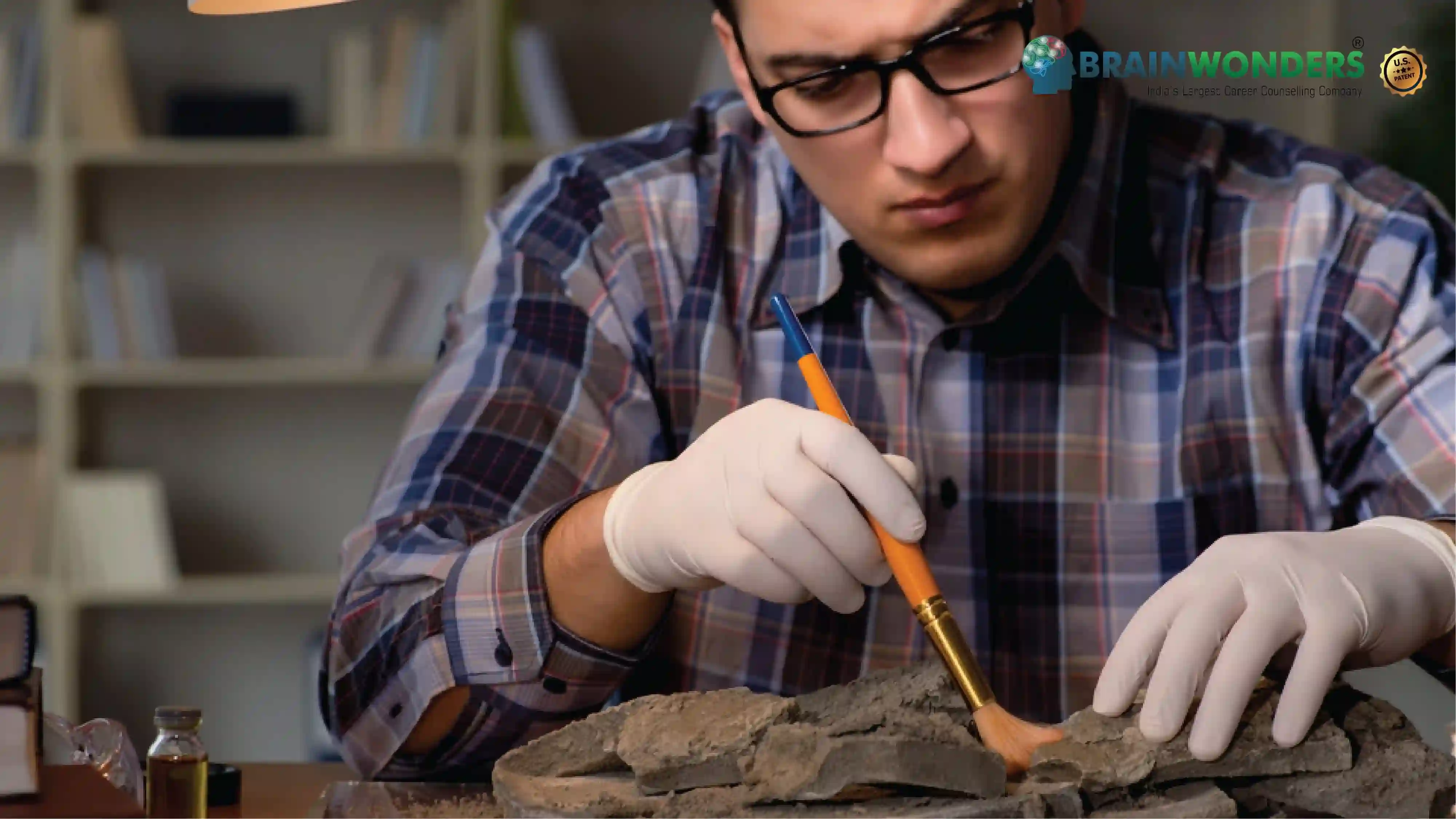How to become a Historian
Overview, Courses, Exam, Colleges, Pathways, Salary

Overview
Who is Historian ?
Historians conduct research and analysis to interpret the past. whenever there is a requirement for details or attested reports related to the past, historians play a major role. They write books, articles, publications on different topics from different eras. They work with data from the ancient period, to some specific decade of importance, to even particular event held in the past. Historians range in different specialisations, be it from an expert in U.S. history, South African history, medieval historians; they may also specialize in history types such as the history of women or the history of science.
They study the facts and share the output with the general public. They discover, maintain and preserve authentic historical data, sites consisting of ancient artefacts as well as documents in museums and libraries that are of great importance. They study the history of different cultures, societies and ethnicities. They also engage in public exhibitions and conferences. They investigate the present and the past by going through the archived records, signature evaluation, restoring artefacts, verification of authenticity and tracing down the origin of the evidence found.
Typical day at work
What does Historian do?
In order to become a historian the following points need to be considered:
- They need to gather historical data from artefacts, libraries, archives.
- They decide if the data collected is authentic or not.
- They determine if the historical data collected is significant or not.
- They translate historical documents into an easily understandable language.
- They conduct researches on the ancient development of cities, empires, countries and tribes.
- They preserve documents and excavated artefacts in museums or libraries
- They teach and practice research in schools and universities.
- They determine the importance of historical data, as to what or how much value they hold.
- They engage with the public through educational programmes or presentations.
- They write reports, articles and books on different theories and findings.
Abilities and Aptitude needed
What are the skills, abilities & aptitude needed to become Historian?
To become a historian the individual must be efficient in reading comprehension as they will require a lot to readability before they start with researches. They also need to be active listeners to help gather information while conducting discussions or debates. They must work on their writing skills as well as they will be involved in a lot of documentation processes. Their speaking ability must also be fluent so as to help them while expressing out their views or thoughts. They must be critical thinkers and resourceful problem solvers.
Active learning must come in handy to them as they will encounter new situations every day. They need to be good at monitoring as well for getting better at observational tasks. They need a lot of time management skills as well as judgement abilities for better decision making. Apart from all these, they must have a keen vision and better oral comprehension and speech clarity.
Salary
Salary for Historian?
Salary information for a Historian in India:
- Minimum Monthly Salary: For entry-level Historians or those starting their careers, the minimum monthly salary may range from INR 20,000 to INR 30,000, especially in smaller organizations, research institutions, or as freelance historians.
- Maximum Monthly Salary: Experienced and highly skilled Historians working in senior research positions, universities, or with specialized expertise can earn a maximum monthly salary of INR 50,000 to INR 1,00,000 or more.
- Annual Salary: The annual salary of a Historian can be from INR 3,00,000 to several lakhs, depending on their level of experience, expertise, and the nature of their work, whether it is research-oriented, academic, or consultancy-based.
- Highest-Paying Job and Scope: The highest-paying jobs for Historians are often found in academic institutions, universities, and research organizations, where they may lead research projects or occupy prestigious faculty positions. Historians with extensive research experience and recognition in their field may also be invited to consult on high-profile historical projects or provide expert opinions for government initiatives and cultural heritage preservation.The scope for Historians in India is promising, with opportunities in academia, research institutions, museums, and cultural heritage organizations. Additionally, Historians can contribute to government projects related to policy development, historical conservation, and heritage tourism.
Pathways
How to become an Historian?
Entrance Exam
Entrance Exam for Historian ?
Courses
Which course I can pursue?
Best Colleges
Which are the best colleges to attend to become an Historian?
Industries
Which Industries are open for Historian?
Historians have diverse career opportunities across various industries where their expertise in research, analysis, and understanding of the past is highly valuable. Some of the industries open for historians include:
- Academia and Education: Historians can work as professors, lecturers, or researchers in universities, colleges, and research institutions, educating students and conducting historical research.
- Museums and Cultural Heritage: Historians play a crucial role in curating exhibits, researching historical artefacts, and preserving cultural heritage in museums and historical sites.
- Archives and Libraries: Historians work in archives and libraries to preserve and manage historical documents, manuscripts, and records for research purposes.
- Government and Public Policy: Historians may work with government agencies, providing historical research and analysis to inform policy decisions and historic preservation efforts.
- Media and Journalism: Historians can contribute to media outlets, providing historical context and analysis for documentaries, historical TV shows, and print publications.
- Publishing and Editing: Historians can work as authors, editors, or researchers for historical books, academic journals, and publications.
- Historical Consultancy: Historians may work as consultants for historical research projects, providing expertise to businesses, organizations, and government bodies.
- Cultural Resource Management: Historians may work in cultural resource management firms, conducting historical assessments and preserving historical sites in compliance with regulations.
- Non-Profit Organizations: Historians may find opportunities with non-profit organizations focused on historic preservation, cultural heritage, and historical research.
- Heritage Tourism: Historians can work in the tourism industry, guiding tours and providing historical insights at historical sites and landmarks.
- Genealogy and Family History Research: Historians may work in genealogy research firms, helping individuals trace their family histories and genealogical roots.
- Historical Publications and Media Production: Historians can contribute to historical documentaries, podcasts, and media production, providing historical expertise and insights.
- Archaeology: Historians interested in archaeology may collaborate on archaeological projects to uncover and interpret historical sites and artefacts.
internship
Are there internships available for Historian?
Internships for historians can provide valuable hands-on experience and exposure to the field of history. While internships for historians may not be as common as those in other fields, several opportunities are available. Here are some potential sources to find internships as a historian:
- Museums and Historical Sites: Many museums and historical sites offer internships for historians to assist with research, curation, exhibition development, and educational programs.
- Libraries and Archives: Libraries and archives often have internship programs for historians to work on cataloguing, digitization, and research projects related to historical documents and artefacts.
- Historical Societies and Non-Profit Organizations: Historical societies and non-profit organizations dedicated to preserving and promoting history may offer internships for historians to support their initiatives and research projects.
- Academic Institutions: Universities and colleges with history departments may have internships for history students to gain experience in teaching, research, or museum studies.
- Government Agencies: Some government departments or agencies, such as cultural heritage organizations, may offer internships for historians to work on historical preservation and research projects.
- Historical Publications and Media: Publications and media outlets focused on historical content may have internships for historians to contribute to research, writing, and content development.
- Research Institutes: Historical research institutes and think tanks may offer internships for historians to engage in specialized research and analysis.
- Archaeological Projects: Historians interested in archaeology may find internships with archaeological excavations and research projects.
- Cultural Exchange Programs: Some cultural exchange programs may offer internships for historians interested in studying and documenting historical and cultural traditions.
- Online Platforms and Digital History Projects: Websites and platforms dedicated to digital history and historical research may offer internships for historians with expertise in digital tools and methodologies.
Career outlook
What does the future look like for Historian?
Historians generally face very strong competition in their working area. Practical experience such as collections, fundraising, or exhibit design is a must for a better job opportunity. Experience can also be obtained through an internship, related work experiences or volunteering. The perks and benefits an individual enjoys while being a historian is working in museums, travel and explore different parts of the world as well as gain first-hand experience with ancient art and culture.
Many organisations such as historical societies and historical consulting companies, hire historians are normally clinging to donations or public funding. A few specific options provided to individuals as career outlook are genealogists, historiographers, personal historians, protohistorians, public historian.



